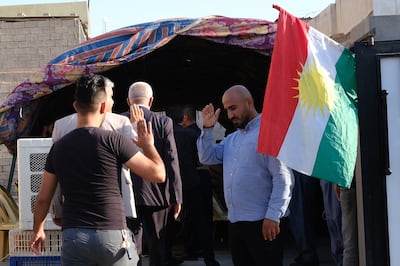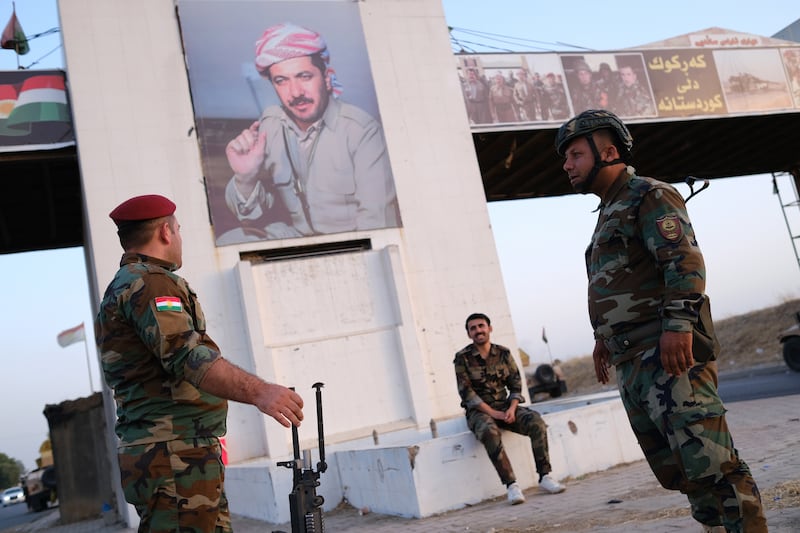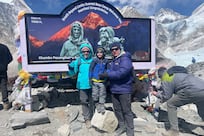Iraq’s highest court has stopped the handover of a federal police building in the northern province of Kirkuk to the Kurdish Democratic Party.
The proposed move had caused tensions in the city, which is home to Kurds, Arabs and Turkmen.
Four protesters – reported to be Kurds – were shot dead in Kirkuk on Saturday, as ethnic groups clashed.
In a governorate where there has been decades of intercommunal conflict, the dispute centres on a building in Kirkuk city that was once the headquarters of the KDP but occupied by the army after 2017.
A Supreme Court ruling on Sunday halted an order from Prime Minister Mohammed Shia Al Sudani in his capacity as the commander-in-chief of Iraq's armed forces to hand over the army building to the KDP on September 1.
Iraqi Kurdish Prime Minister Masrour Barzani, of the KDP, described the court’s decision as a “farce” in a post on X, formerly Twitter.
Federal forces seized Kirkuk and surrounding oilfields in October 2017 after the KDP organised a referendum for Kurdish independence.
This referendum, which was opposed by international allies of the Kurdish regional government, including the US and the UK, would have annexed Kirkuk, wrapping the governorate into Iraq's semi-autonomous Kurdish region.
The KDP vacated its headquarters in the city at the time, and within weeks of the vote, federal Iraqi government forces had retaken control of the governorate.
The agreement to form the current government, under the leadership of Mr Al Sudani, included a provision for the return of the KDP to the province, which met opposition from some communities in Kirkuk.
At a cabinet meeting on Sunday, Mr Al Sudani reiterated orders he had issued to the authorities to investigate the circumstances surrounding the death of the four protesters and “hold all those responsible for the deaths and injuries accountable in accordance with the law”.
The announced investigation followed Prime Minister Barzani's call on the Iraqi government “to intervene immediately to protect the lives of citizens, public property and demonstrators. We cannot allow irresponsible individuals to escalate and exacerbate the situation.”
Mr Al Sudani met with members of parliament who represent Kirkuk to discuss the situation on Sunday. He called the deaths “regrettable”.

Last week, a group of Arab residents closed the Kirkuk to Erbil motorway in protest against the reopening of the KDP headquarters.
On Saturday, Kurdish protesters demanded the reopening of the road, leading tensions with security forces.
Following Saturday's violence, Iraqi security forces were sent to deter further clashes.
Amir Shwani, Kirkuk police spokesman, said a curfew had been lifted and vehicles were moving normally in the city on Sunday.
But security forces sent additional personnel to the streets to “prevent violence and protect civilians”, he added.
Kirkuk, which lies along the fault lines between the Kurdish autonomous region and areas controlled by Iraq's Shiite-dominated central government, has been the focus of some of the country's worst post-ISIS violence.
The governorate is home to Iraq's oldest continually producing oilfields, which are thought to contain up to nine billion barrels of recoverable oil.
The fields and related infrastructure were briefly under the control of Kurdish Peshmerga forces during the war against ISIS, but were regained by federal government forces following the failed Kurdish independence referendum.
The final status of the mixed-ethnicity and mixed-religion province is supposed to be settled by a referendum, outlined in Iraq's 2005 constitution, but steps to put the constitutional article into effect have either been delayed by security problems or avoided because of political controversy in Baghdad and Erbil.







